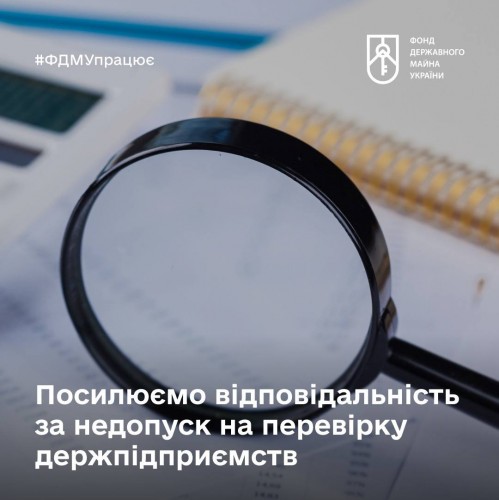The State Property Fund proposes to introduce fines for non-admission to inspection of state-owned enterprises

The State Property Fund of Ukraine proposes to introduce the responsibility of heads of state-owned enterprises for non-admission to the audit and late submission of the financial plan. Bill No. 8293 is registered in the Verkhovna Rada.
Why did we initiate this? The State Property Fund faced repeated non-admissions conducting an internal audit of subordinate state-owned enterprises. For example, during 2021-2022, representatives of the Fund were not allowed to check at the Zaporizhzhia Aluminum Production Plant (state share of 68.009%) and the Kvant plant (state share of 73.28%).
In addition, the State Property Fund sometimes faces inaction of heads of state-owned enterprises. For example, 119 state-owned enterprises didn’t submit financial plans for 2021 for approval on time, and an even greater number of them (138) didn’t submit financial plans for 2022. At the same time, 443 state-owned enterprises didn’t submit financial plans for 2021 and 519 enterprises didn’t submit financial plans for 2021 at all.
In order to solve these problems, the State Property Fund proposed to establish the responsibility of managers for non-admission to theinternal audit, as well as for late submission, agreementor approval of the annual financial plan and report on its implementation.
The amount of the fine that will be imposed on the heads of state-owned enterprises for non-admission to the audit will vary from one to three thousand tax-free minimum incomes of citizens, and for failure to submit a financial plan – from one hundred to five hundred tax-free minimums.
The Fund also initiated increased liability for violation of the requirements of privatization bodies for the timely submission of reliable information about privatization objects to be sold or the submission of information not in full. The amount of responsibility of the heads of state-owned enterprises for these violations is proposed to set at the level of from one hundred to two hundred and fifty tax-free minimum incomes of citizens.
The adoption of the bill will strengthen the protection of property interests of the state and increase the responsibility of heads of state-owned enterprises for inefficient management.